外研版(2019)必修 第二册Unit 6 Earth first Using language公开课课件(共32张PPT)
文档属性
| 名称 | 外研版(2019)必修 第二册Unit 6 Earth first Using language公开课课件(共32张PPT) | 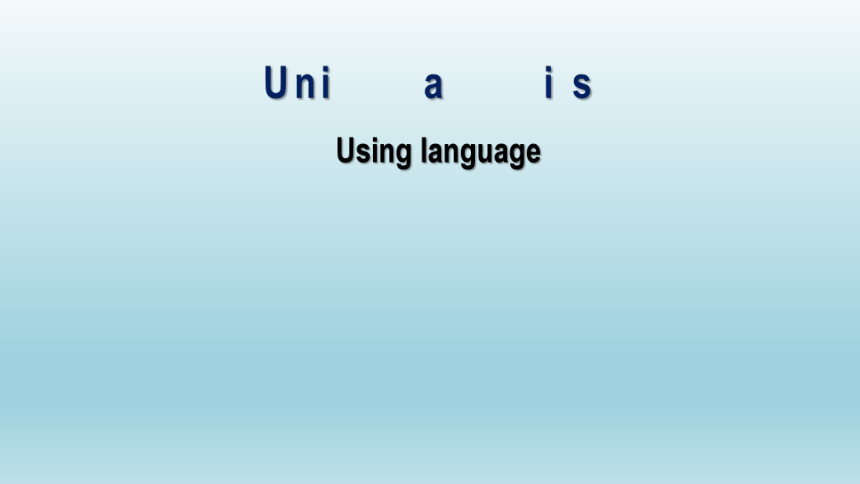 | |
| 格式 | pptx | ||
| 文件大小 | 1.0MB | ||
| 资源类型 | 教案 | ||
| 版本资源 | 外研版(2019) | ||
| 科目 | 英语 | ||
| 更新时间 | 2023-02-28 19:30:50 | ||
图片预览

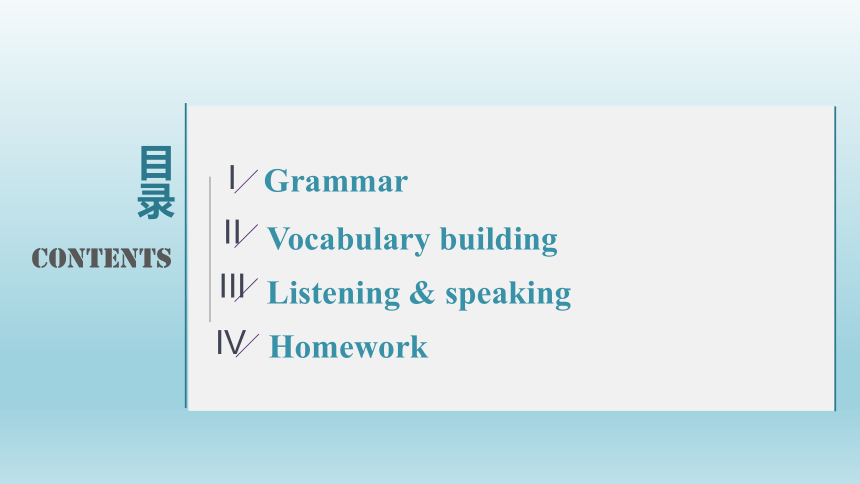
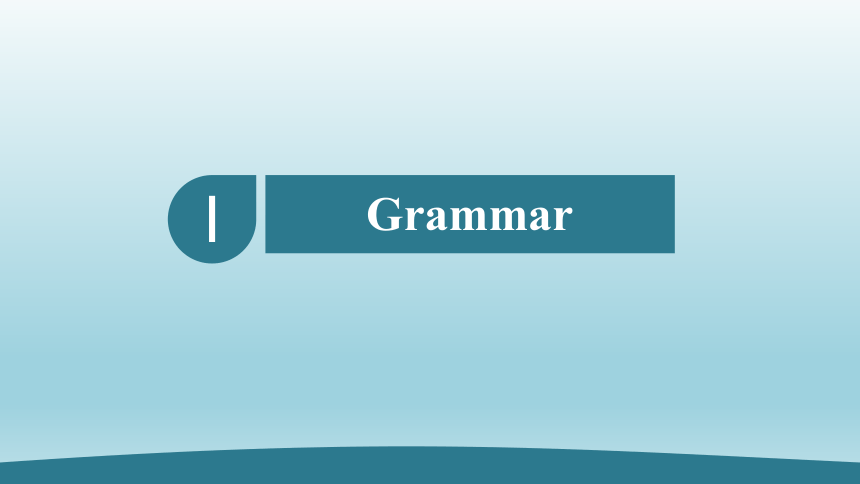
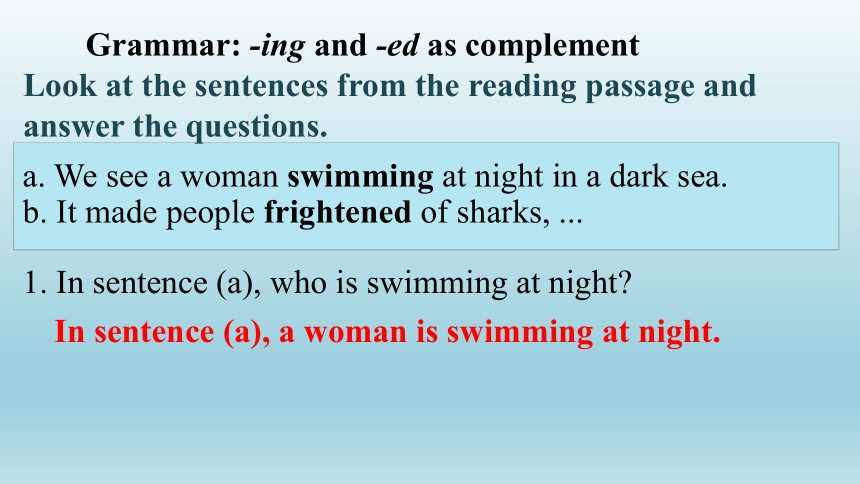
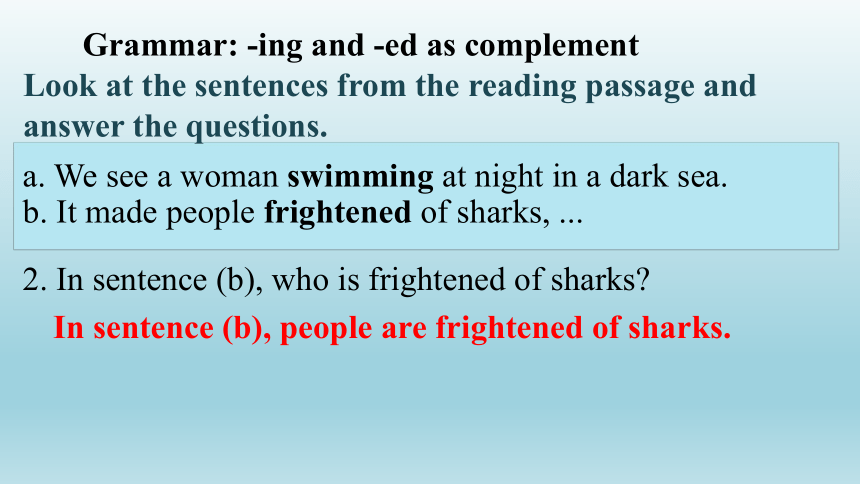
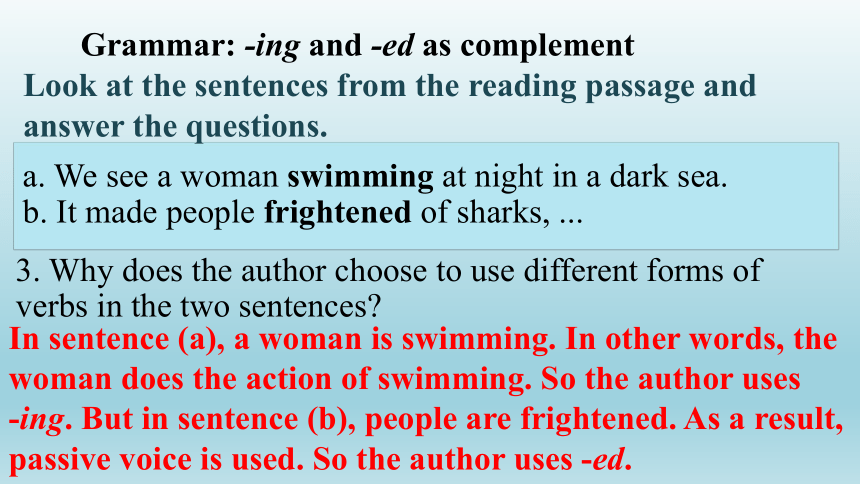
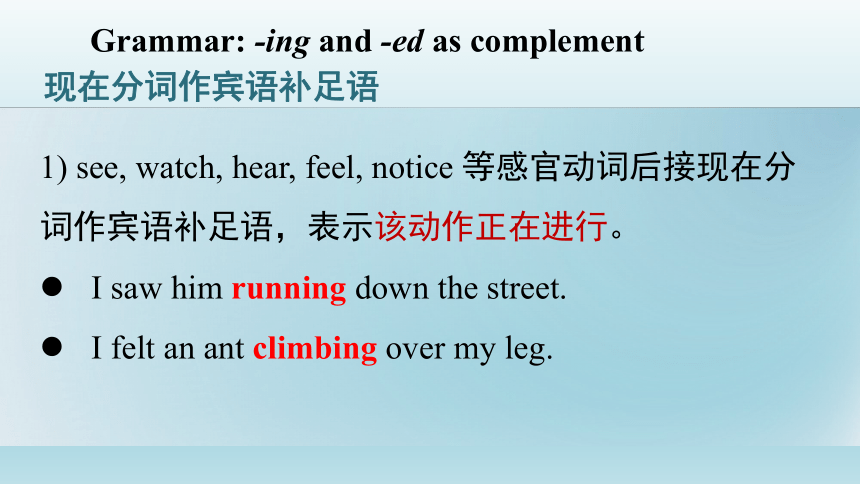
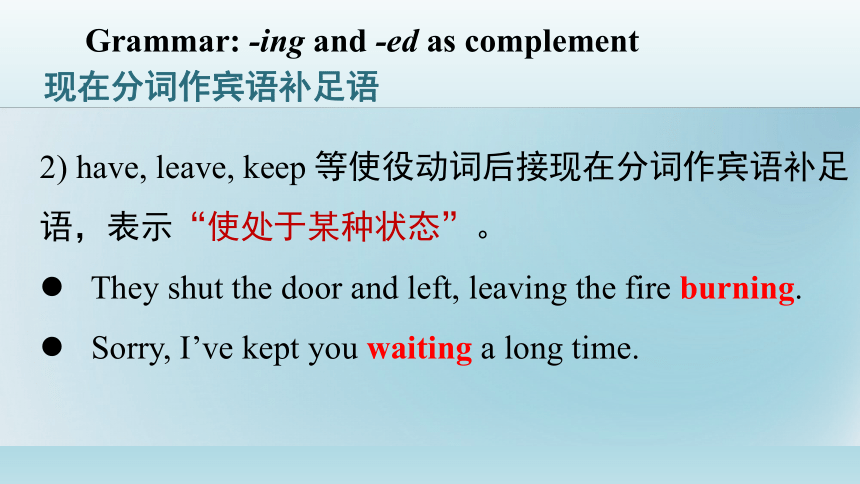
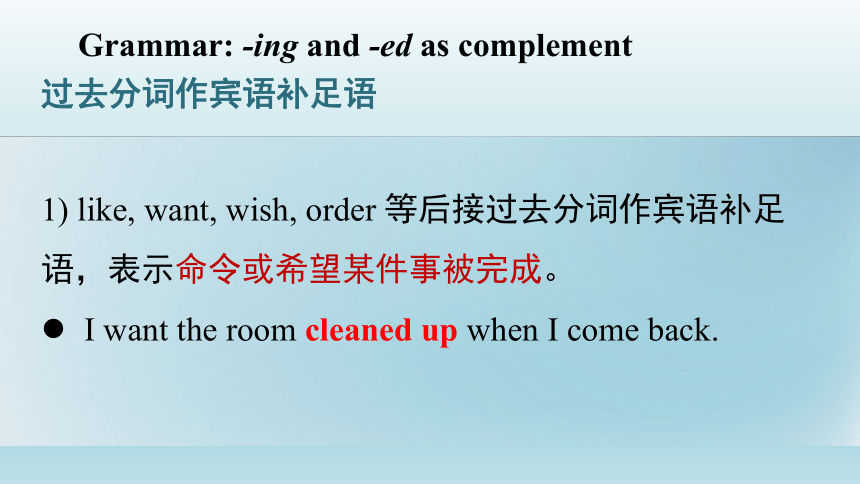
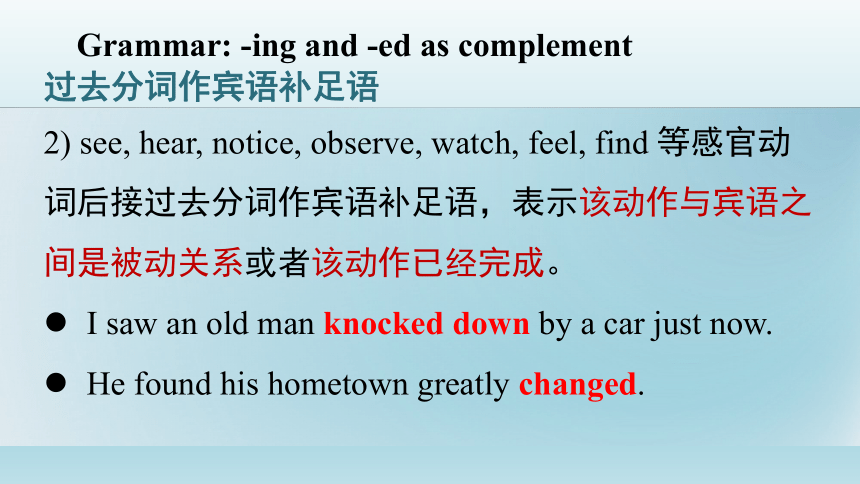
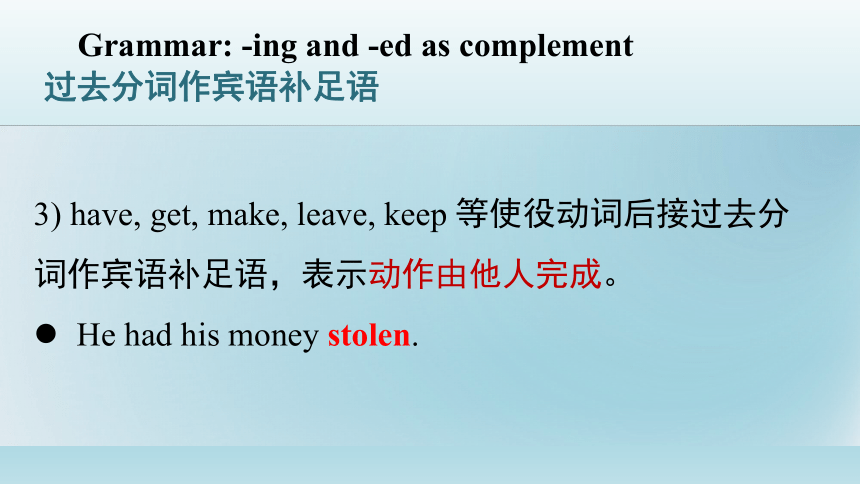
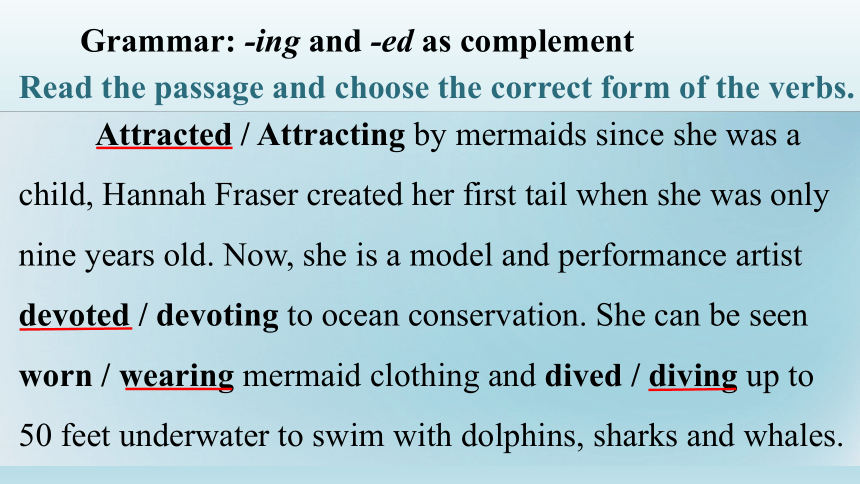
文档简介
(共32张PPT)
Using language
Unit 6 Earth First
目录
contents
Grammar
I
IV
Vocabulary building
II
Listening & speaking
III
Homework
Grammar
I
a. We see a woman swimming at night in a dark sea.
b. It made people frightened of sharks, ...
Grammar: -ing and -ed as complement
1. In sentence (a), who is swimming at night
Look at the sentences from the reading passage and answer the questions.
In sentence (a), a woman is swimming at night.
a. We see a woman swimming at night in a dark sea.
b. It made people frightened of sharks, ...
Grammar: -ing and -ed as complement
2. In sentence (b), who is frightened of sharks
Look at the sentences from the reading passage and answer the questions.
In sentence (b), people are frightened of sharks.
a. We see a woman swimming at night in a dark sea.
b. It made people frightened of sharks, ...
Grammar: -ing and -ed as complement
3. Why does the author choose to use different forms of verbs in the two sentences
Look at the sentences from the reading passage and answer the questions.
In sentence (a), a woman is swimming. In other words, the woman does the action of swimming. So the author uses
-ing. But in sentence (b), people are frightened. As a result, passive voice is used. So the author uses -ed.
Grammar: -ing and -ed as complement
1) see, watch, hear, feel, notice 等感官动词后接现在分 词作宾语补足语,表示该动作正在进行。
I saw him running down the street.
I felt an ant climbing over my leg.
现在分词作宾语补足语
Grammar: -ing and -ed as complement
2) have, leave, keep 等使役动词后接现在分词作宾语补足语,表示“使处于某种状态”。
They shut the door and left, leaving the fire burning.
Sorry, I’ve kept you waiting a long time.
现在分词作宾语补足语
Grammar: -ing and -ed as complement
1) like, want, wish, order 等后接过去分词作宾语补足 语,表示命令或希望某件事被完成。
I want the room cleaned up when I come back.
过去分词作宾语补足语
Grammar: -ing and -ed as complement
2) see, hear, notice, observe, watch, feel, find 等感官动 词后接过去分词作宾语补足语,表示该动作与宾语之 间是被动关系或者该动作已经完成。
I saw an old man knocked down by a car just now.
He found his hometown greatly changed.
过去分词作宾语补足语
Grammar: -ing and -ed as complement
3) have, get, make, leave, keep 等使役动词后接过去分 词作宾语补足语,表示动作由他人完成。
He had his money stolen.
过去分词作宾语补足语
Grammar: -ing and -ed as complement
Attracted / Attracting by mermaids since she was a child, Hannah Fraser created her first tail when she was only nine years old. Now, she is a model and performance artist devoted / devoting to ocean conservation. She can be seen worn / wearing mermaid clothing and dived / diving up to 50 feet underwater to swim with dolphins, sharks and whales.
Read the passage and choose the correct form of the verbs.
Grammar: -ing and -ed as complement
She appeared in The Cove, a documentary aiming at highlighting the cruelty of dolphin hunting. Besides performing and modelling, Hannah travels the world given / giving presentations and talks, getting more people involved / involving in the conservation of ocean life.
Read the passage and choose the correct form of the verbs.
Grammar: -ing and -ed as complement
Here, you can see dramatic landscapes. They change from
mountains to grasslands, forests to rivers.
Rewrite the underlined sentences in the interview, using the -ing and -ed forms to make it more compact and coherent.
Here, you can see dramatic landscapes changing from mountains to grasslands, forests to rivers.
Grammar: -ing and -ed as complement
In recent years, we have seen large areas of wetland that
were damaged by human activity.
Rewrite the underlined sentences in the interview, using the -ing and -ed forms to make it more compact and coherent.
In recent years, we have seen large areas of wetland damaged by human activity.
Grammar: -ing and -ed as complement
This includes keeping the original environment from being
touched, ...
Rewrite the underlined sentences in the interview, using the -ing and -ed forms to make it more compact and coherent.
This includes keeping the original environment untouched, …
Vocabulary building
II
Vocabulary building: Dealing with global warming
Share what you know about these expressions.
A carbon footprint is the amount of greenhouse gases — primarily carbon dioxide — released into the air by a particular human activity. For example, when you drive a car, the engine burns fuel which creates a certain amount of greenhouse gases. When you heat your house with coal or electricity, you also generate greenhouse gases. Even the production of food and goods emits some quantities of greenhouse gases. Together these emissions make up a carbon footprint.
Vocabulary building: Dealing with global warming
Vocabulary building: Dealing with global warming
Complete the brochure with the expressions related to global warming.
Six things you can do NOW to help stop global warming
Reduce waste by choosing reusable products - get a(n) 1 _____________________,
for example.
reusable water bottle
Vocabulary building: Dealing with global warming
Complete the brochure with the expressions related to global warming.
Try to reduce your 2 ___________________. Walk or ride a bike instead of taking a car.
Use 3 _______________ such as solar energy and wind power.
The less energy you use, the less carbon dioxide is released. Replacing a regular light bulb with a(n) 4 _______________ is a great start.
carbon footprint
renewable energy
LED bulb
Vocabulary building: Dealing with global warming
Complete the brochure with the expressions related to global warming.
5 __________________ is important because clean water is a limited resource. Also, we use a lot of energy to process clean water.
Planting trees can help a lot in reducing the
6 ________________ because trees absorb the carbon
dioxide in the air.
Water conservation
greenhouse effect
Vocabulary building: Dealing with global warming
Work in pairs. Discuss what you can do to help deal with global warming, using the words and expressions you have learnt.
Example:
A: I will go to school by bike to reduce my carbon footprint.
B: I will bring a reusable bag when I go shopping.
…
Listening & speaking
III
Listening & speaking: Before listening
Do You Know
Smog comes from the words “smoke” and “fog”, and it is used to describe the air pollution in cities caused mainly by traffic and factories. Smog can be dangerous because it causes severe breathing problems and infections.
1. What the word “smog” means.
2. When the word “smog” appeared.
3. What caused smog in the past.
4. What causes smog now.
5. The effects of smog on the environment.
6. How governments try to reduce smog.
7. What will happen if we don’t reduce smog.
Listening & speaking: While-listening
Listen to the lecture and choose the topics that are covered.
√
√
√
√
√
Listening & speaking: While-listening
Smog in the past
Term created in: 1. _______
Big problem in London: 2. _______________
in December 1952
Causes of the problem: burning too much coal
and 3. __________
Listen again and complete the slides.
The Great Smog
1900s
no wind
Listening & speaking: While-listening
Smog in the present
Causes of the problem: 4. ________________________
and factories
Measures: rules about using 5. ________ in factories
and 6. ___________________________
in the city centre
chemicals
chemicals coming from traffic
requirements of paying to drive
Listen again and complete the slides.
Listening & speaking: Post-listening
A polite interruption is usually framed as a request for permission to interrupt someone, often starting with If ..., May I ... or Can I ... This may be preceded with an apology such as Sorry, ... or Excuse me, ... Usually we interrupt someone when they pause for breath, or during the slight pause between spoken clauses.
Learning to learn
Listening & speaking: Pair work
Work in pairs and talk about recycling.
Student A: Turn to Page 84.
Student B: Turn to Page 87.
Homework
IV
Homework
1. Summarize the usage of -ing and -ed as complement.
2. Talk about another environmental problem and have a similar conversation.
Using language
Unit 6 Earth First
目录
contents
Grammar
I
IV
Vocabulary building
II
Listening & speaking
III
Homework
Grammar
I
a. We see a woman swimming at night in a dark sea.
b. It made people frightened of sharks, ...
Grammar: -ing and -ed as complement
1. In sentence (a), who is swimming at night
Look at the sentences from the reading passage and answer the questions.
In sentence (a), a woman is swimming at night.
a. We see a woman swimming at night in a dark sea.
b. It made people frightened of sharks, ...
Grammar: -ing and -ed as complement
2. In sentence (b), who is frightened of sharks
Look at the sentences from the reading passage and answer the questions.
In sentence (b), people are frightened of sharks.
a. We see a woman swimming at night in a dark sea.
b. It made people frightened of sharks, ...
Grammar: -ing and -ed as complement
3. Why does the author choose to use different forms of verbs in the two sentences
Look at the sentences from the reading passage and answer the questions.
In sentence (a), a woman is swimming. In other words, the woman does the action of swimming. So the author uses
-ing. But in sentence (b), people are frightened. As a result, passive voice is used. So the author uses -ed.
Grammar: -ing and -ed as complement
1) see, watch, hear, feel, notice 等感官动词后接现在分 词作宾语补足语,表示该动作正在进行。
I saw him running down the street.
I felt an ant climbing over my leg.
现在分词作宾语补足语
Grammar: -ing and -ed as complement
2) have, leave, keep 等使役动词后接现在分词作宾语补足语,表示“使处于某种状态”。
They shut the door and left, leaving the fire burning.
Sorry, I’ve kept you waiting a long time.
现在分词作宾语补足语
Grammar: -ing and -ed as complement
1) like, want, wish, order 等后接过去分词作宾语补足 语,表示命令或希望某件事被完成。
I want the room cleaned up when I come back.
过去分词作宾语补足语
Grammar: -ing and -ed as complement
2) see, hear, notice, observe, watch, feel, find 等感官动 词后接过去分词作宾语补足语,表示该动作与宾语之 间是被动关系或者该动作已经完成。
I saw an old man knocked down by a car just now.
He found his hometown greatly changed.
过去分词作宾语补足语
Grammar: -ing and -ed as complement
3) have, get, make, leave, keep 等使役动词后接过去分 词作宾语补足语,表示动作由他人完成。
He had his money stolen.
过去分词作宾语补足语
Grammar: -ing and -ed as complement
Attracted / Attracting by mermaids since she was a child, Hannah Fraser created her first tail when she was only nine years old. Now, she is a model and performance artist devoted / devoting to ocean conservation. She can be seen worn / wearing mermaid clothing and dived / diving up to 50 feet underwater to swim with dolphins, sharks and whales.
Read the passage and choose the correct form of the verbs.
Grammar: -ing and -ed as complement
She appeared in The Cove, a documentary aiming at highlighting the cruelty of dolphin hunting. Besides performing and modelling, Hannah travels the world given / giving presentations and talks, getting more people involved / involving in the conservation of ocean life.
Read the passage and choose the correct form of the verbs.
Grammar: -ing and -ed as complement
Here, you can see dramatic landscapes. They change from
mountains to grasslands, forests to rivers.
Rewrite the underlined sentences in the interview, using the -ing and -ed forms to make it more compact and coherent.
Here, you can see dramatic landscapes changing from mountains to grasslands, forests to rivers.
Grammar: -ing and -ed as complement
In recent years, we have seen large areas of wetland that
were damaged by human activity.
Rewrite the underlined sentences in the interview, using the -ing and -ed forms to make it more compact and coherent.
In recent years, we have seen large areas of wetland damaged by human activity.
Grammar: -ing and -ed as complement
This includes keeping the original environment from being
touched, ...
Rewrite the underlined sentences in the interview, using the -ing and -ed forms to make it more compact and coherent.
This includes keeping the original environment untouched, …
Vocabulary building
II
Vocabulary building: Dealing with global warming
Share what you know about these expressions.
A carbon footprint is the amount of greenhouse gases — primarily carbon dioxide — released into the air by a particular human activity. For example, when you drive a car, the engine burns fuel which creates a certain amount of greenhouse gases. When you heat your house with coal or electricity, you also generate greenhouse gases. Even the production of food and goods emits some quantities of greenhouse gases. Together these emissions make up a carbon footprint.
Vocabulary building: Dealing with global warming
Vocabulary building: Dealing with global warming
Complete the brochure with the expressions related to global warming.
Six things you can do NOW to help stop global warming
Reduce waste by choosing reusable products - get a(n) 1 _____________________,
for example.
reusable water bottle
Vocabulary building: Dealing with global warming
Complete the brochure with the expressions related to global warming.
Try to reduce your 2 ___________________. Walk or ride a bike instead of taking a car.
Use 3 _______________ such as solar energy and wind power.
The less energy you use, the less carbon dioxide is released. Replacing a regular light bulb with a(n) 4 _______________ is a great start.
carbon footprint
renewable energy
LED bulb
Vocabulary building: Dealing with global warming
Complete the brochure with the expressions related to global warming.
5 __________________ is important because clean water is a limited resource. Also, we use a lot of energy to process clean water.
Planting trees can help a lot in reducing the
6 ________________ because trees absorb the carbon
dioxide in the air.
Water conservation
greenhouse effect
Vocabulary building: Dealing with global warming
Work in pairs. Discuss what you can do to help deal with global warming, using the words and expressions you have learnt.
Example:
A: I will go to school by bike to reduce my carbon footprint.
B: I will bring a reusable bag when I go shopping.
…
Listening & speaking
III
Listening & speaking: Before listening
Do You Know
Smog comes from the words “smoke” and “fog”, and it is used to describe the air pollution in cities caused mainly by traffic and factories. Smog can be dangerous because it causes severe breathing problems and infections.
1. What the word “smog” means.
2. When the word “smog” appeared.
3. What caused smog in the past.
4. What causes smog now.
5. The effects of smog on the environment.
6. How governments try to reduce smog.
7. What will happen if we don’t reduce smog.
Listening & speaking: While-listening
Listen to the lecture and choose the topics that are covered.
√
√
√
√
√
Listening & speaking: While-listening
Smog in the past
Term created in: 1. _______
Big problem in London: 2. _______________
in December 1952
Causes of the problem: burning too much coal
and 3. __________
Listen again and complete the slides.
The Great Smog
1900s
no wind
Listening & speaking: While-listening
Smog in the present
Causes of the problem: 4. ________________________
and factories
Measures: rules about using 5. ________ in factories
and 6. ___________________________
in the city centre
chemicals
chemicals coming from traffic
requirements of paying to drive
Listen again and complete the slides.
Listening & speaking: Post-listening
A polite interruption is usually framed as a request for permission to interrupt someone, often starting with If ..., May I ... or Can I ... This may be preceded with an apology such as Sorry, ... or Excuse me, ... Usually we interrupt someone when they pause for breath, or during the slight pause between spoken clauses.
Learning to learn
Listening & speaking: Pair work
Work in pairs and talk about recycling.
Student A: Turn to Page 84.
Student B: Turn to Page 87.
Homework
IV
Homework
1. Summarize the usage of -ing and -ed as complement.
2. Talk about another environmental problem and have a similar conversation.
